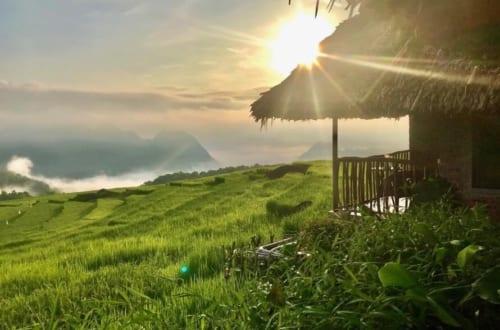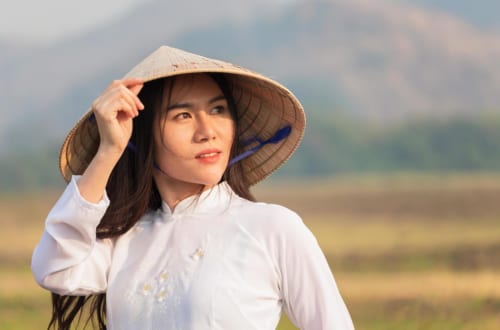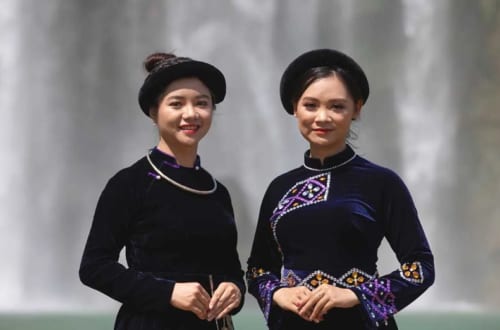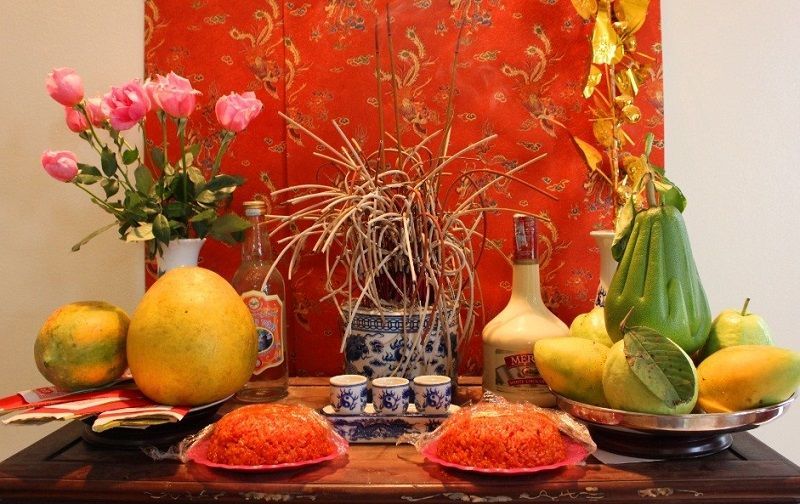
Ancestor worship in Vietnam
Table of contents
A ritual practice common to many religions, ancestor worship in Vietnam dates back to the dawn of time. Perhaps this is the very first belief? Today, this practice still exists in Mexico, Madagascar, China, South Korea and Vietnam, where it takes the name oftín ngưỡng thờ cúng tổ tiên.
Ancestor worship in Vietnam, a practice that connects and unites
These ancient beliefs form the basis of family structure as traditionally understood. They form the invisible link that unites the peoples of the country to the two deltas and to the 54 ethnic communities. They actively and subtly participate in the complex and subtle balance of a nation that has managed to reconcile extremely diverse religious, philosophical and political influences over the years. Vietnam is a predominantly agricultural country. The importance of the land is also found in the worship of the ancestors, in this esoteric nourishing filiation.
Ancestor worship > unity of Vietnam
Ancestor worship in Vietnam links the world of the living to that of the dead. It unites in the same momentum, the members of a family as it unites each Vietnamese and each Vietnamese in a unified vision of the Country. To venerate one’s ancestors is to be part of the temporal continuity of a clan, a family, a Nation. Just as the ancestral altar is placed at the heart of the house, it is at the heart of the family. Witness of the significant events of an existence: birth, marriage, death… In this belief, the dead do not disappear, but stay at the level of the altar dedicated to them. They thus participate, discreetly, in the life of the household.
Ancestor worship is based on this intimate conviction that the soul of a deceased survives after death and that it now has the mission of protecting his descendants, his clan. In the invisible dimension is actually all the spirits: genies, protectors, historical or mythological heroes, demons, wandering souls… and of course, deceased family members. Let it be clear here that although close to Confucianism in its approach to filial piety, ancestor worship is not attached to any religion. It has existed for a long time even before the introduction of religious currents such as Taoism or Buddhism.
Ancestor Worship in Vietnam > spirituality
Today Vietnam knows how to pragmatically accommodate different religious practices. The worship of the ancestors remains this ritual apart in the spiritual life of the Vietnamese. We will not understand the culture, the Vietnamese society, if we do not understand this imbrication of the invisible world (of Yin nature) in the visible world (of Yang substance). Of which the altar of the ancestors is the most obvious materialization. Thus, a spirit can offer its protection to a professional project for example. But in return, the living must make sure to honor the spirits. Failure to worship is likely to lead to serious consequences, such as health problems or financial worries. In the same vein, it is terrifying for a Vietnamese to die childless. This means that no one will take care of his altar and his soul will be doomed to wander without being able to reach the spirit world.
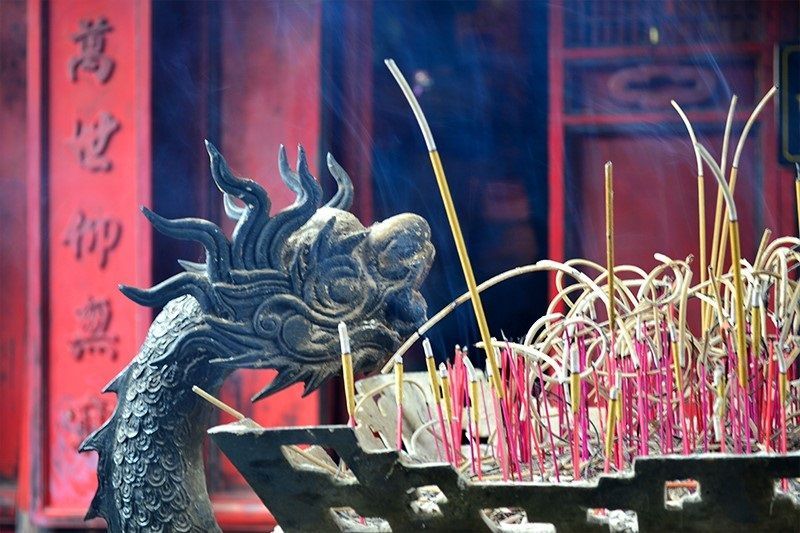
An altar in the heart of the home
It is the symbol of union and solidarity within the family. The ancestral altar is usually located in the central room of the house, although it can also be placed on its top floor. It consists of a small incense box and a small table to put the offerings, the photos of the deceased as well as the wooden tablets with their names inscribed on them. Major decisions are taken before this repository, such as the decision to marry, to build a house… As there is no difference between the world of the living and the world of the dead, there is no therefore not incongruous to present perfectly material things to the altar of the ancestors: food, clothing, daily use objects and money (the latter are made of paper, called Vang ma – votive objects).
Only the food is real. It is usually accompanied by flowers, incense and alcohol (optional) which must be rice. One thing that should not be lacking is a cup of clear water. It is the most precious asset of the rice farmer after the land. After burning the incense sticks, the votive paper will be burned. We will then pour the small cup of alcohol or water on the embers. This is how the dead receive their gifts in the afterlife. Flames and smoke rise into the sky. Liquid alcohol mixes with fire to impregnate the earth. Before our eyes, a fire-water (Yin-Yang) and sky-earth-water (“Three Powers”) osmosis takes place, charged with alchemical content.
Perennial habits and customs
Young people tend to westernize themselves, among other things by celebrating someone’s birth. But the custom of preferring to celebrate the death of a person is still well anchored in Vietnamese society. After all, what could be more important than crossing into the next world? In general, when a family member dies, there is a ceremony on the 3rd day, then another on the 49th day and a big ceremony on the first anniversary of that person’s death. In the past, there was a big celebration on the 100th day, but this tradition has almost been lost. Thereafter, the family commemorates the anniversary of the death each year. Inviting all parents to participate in the ceremony and then to the meal.
Practices of ancestor worship in Vietnam
Other practices related to ancestor worship in Vietnam punctuate the life of the people. Thus, on the 1st and 15th day of the lunar month, we will burn incense. Offerings will also be placed on the altar to venerate the ancestors. And then there are the great festivals (Tet) of the lunar year. In particular the festival of the tombs in the 3rd month, the Têt Doan Ngọ in the 5th month (we know this Tet under the term of “hunting vermin”), the parents’ festival in the 7th month, the Mid-Autumn festival in the 8th month and one of the most important of all, the Tet of the Lunar New Year.
These dates are so many opportunities for families to organize festivities, to invite their loved ones to come and commemorate the ancestors, while giving themselves time to visit each other, to exchange news, to share the joys and penalties. In a way, celebrating and commemorating ancestors contributes to strengthening family and social ties.
The presence of ancestors – from both worlds – is therefore a natural and happy element of the family clan. Throughout the year, the deceased continue to live with their descendants. They are kept informed and associated with all the important events of their family.
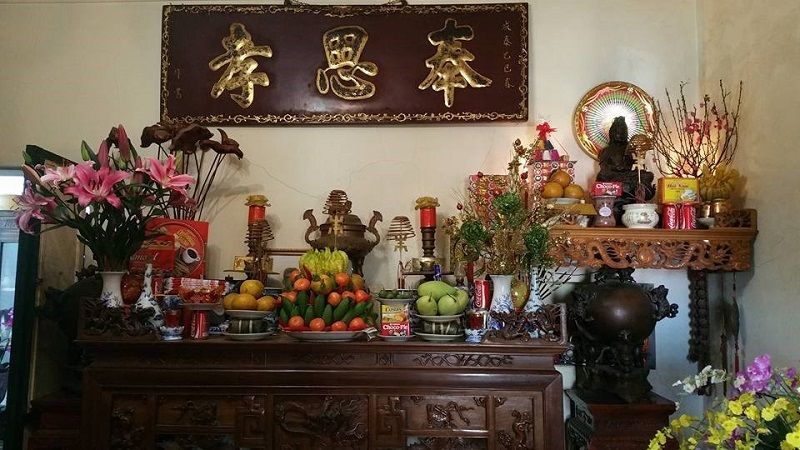
A unique and universal vision of people and the world
We have only scratched the surface here of what ancestor worship represents in the daily, cultural and spiritual reality of the Vietnamese. It can only be seen from the perspective that encompasses other practices. For example, the organization of ceremonies related to ancestor worship expresses the hierarchy of each member in the family line. Similarly, the representations of man, of the universe that underlie ancestor worship, are all elements that cannot be detached from this cultural practice. Offering an interesting mise en abyme of Vietnamese cosmogony.
Ancestor worship in Vietnam helps to develop, maintain and strengthen good family traditions of respect and filial piety. It seems obvious that its deep nature is of a greater scope. Offering a vision of the world and people that is both unique and universal.
You can read and learn more about the veneration of the dead in other cultures and countries here > https://en.wikipedia.org/wiki/Veneration_of_the_dead



